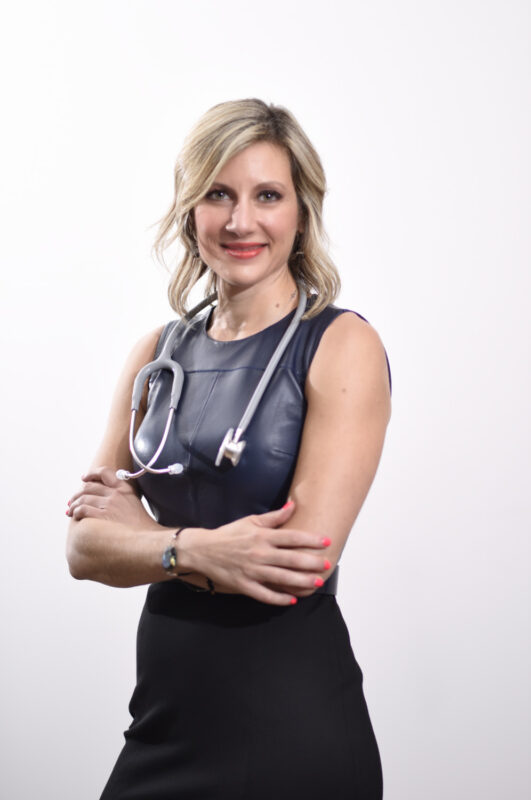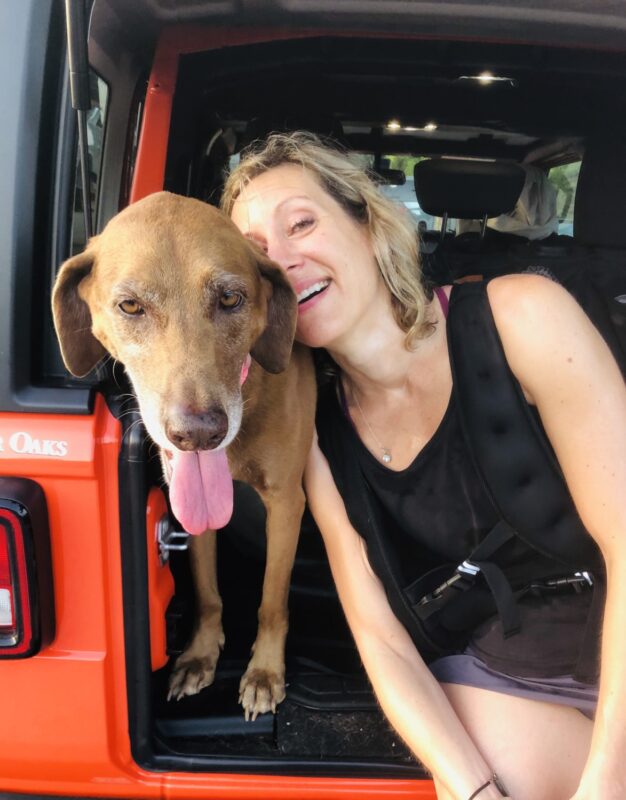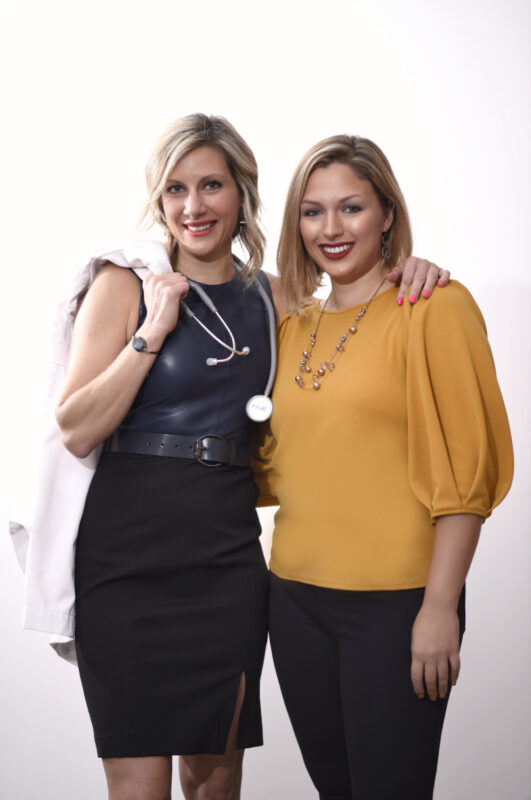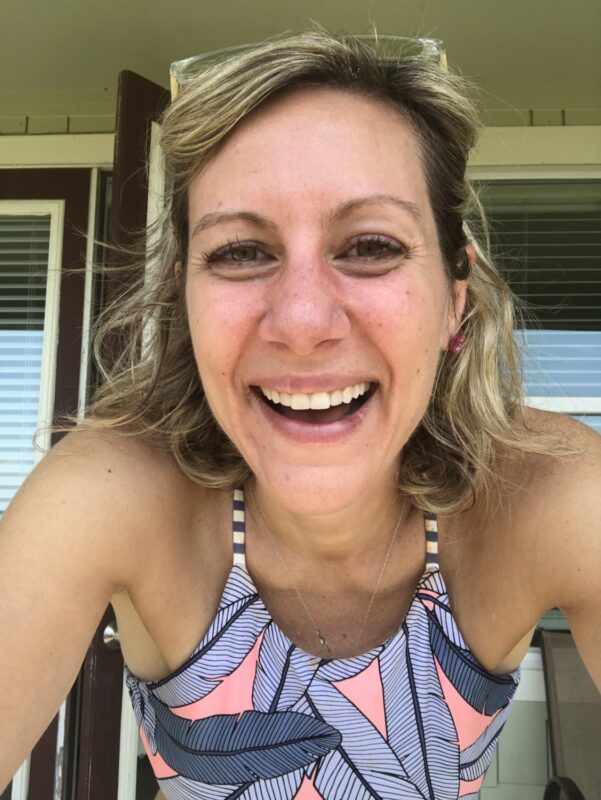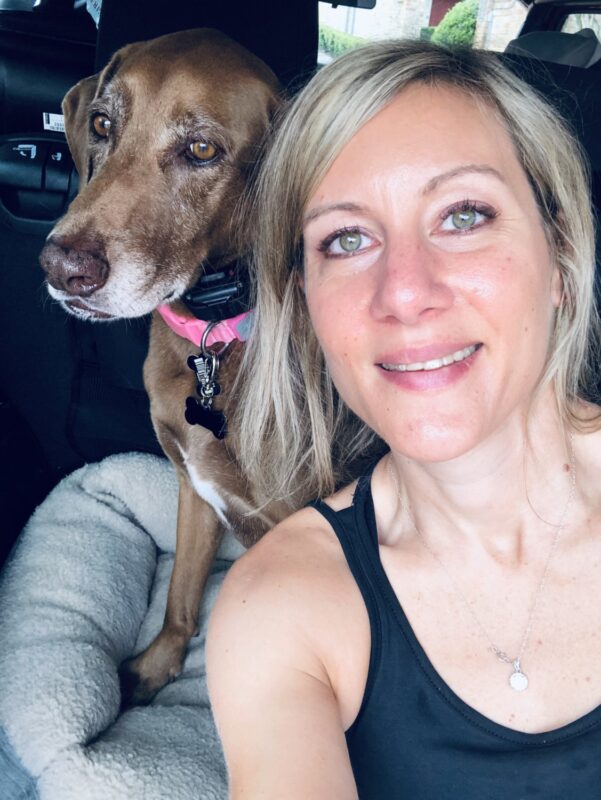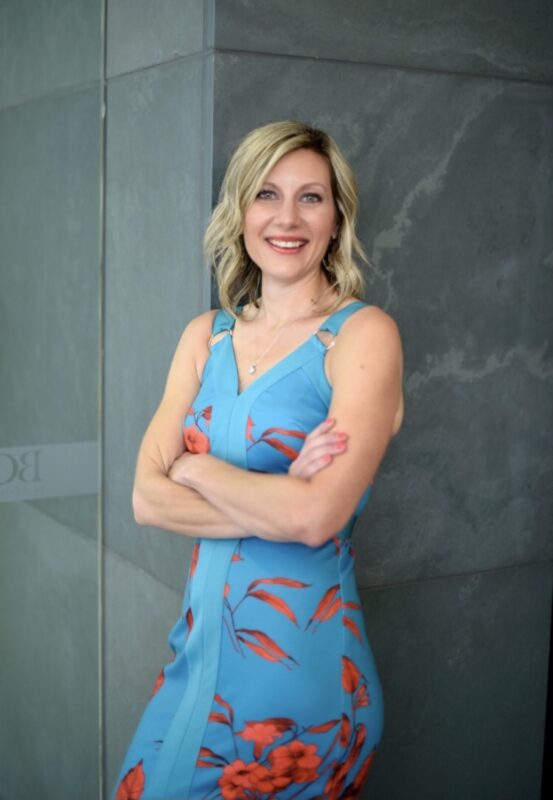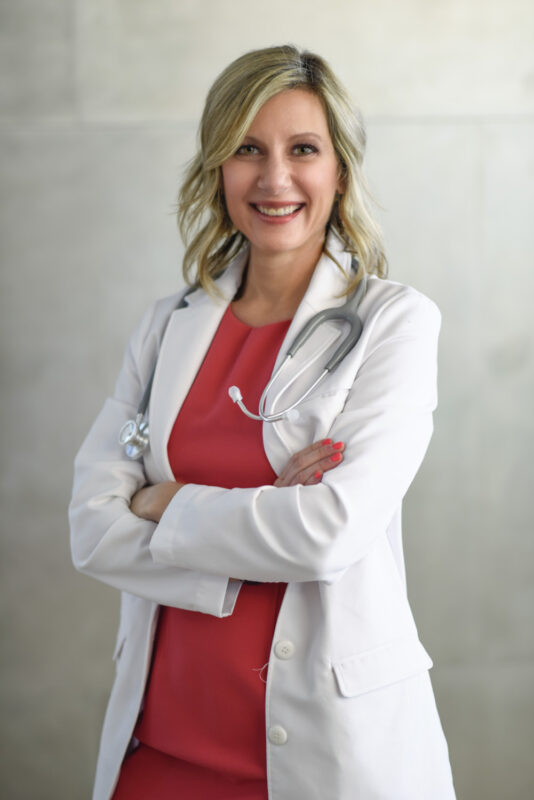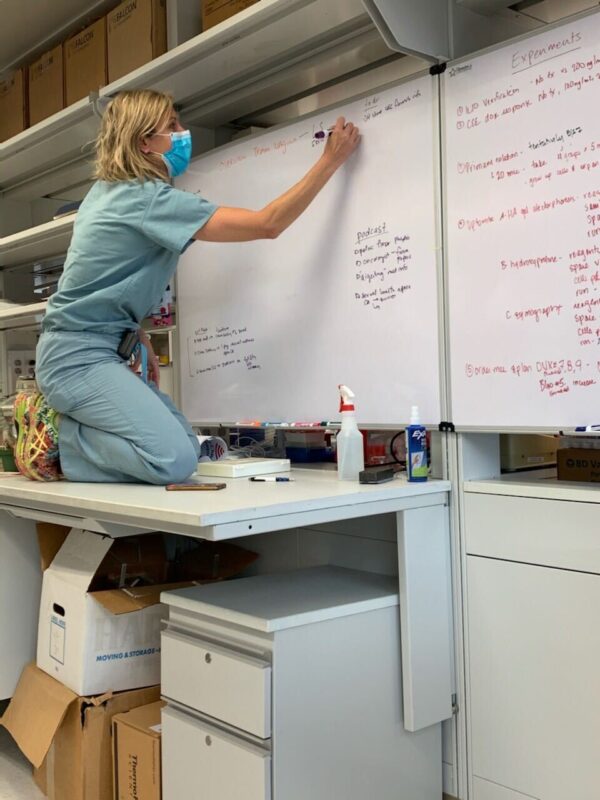Meet Julie Hakim, board-certified OBGYN and Assistant Professor in OBGYN at Baylor College of Medicine and Pediatric Gynecology at Texas Children’s Hospital in Houston, which is the 3rd best children’s hospital in the USA and the best in Texas. She holds multiple NIH-funded awards, she is co-founder of FemTech Focus, a not-for-profit geared towards empowering the women’s health and wellness industry.
Who is Julie Hakim? Define yourself
I am a happy, centered, passionate woman who loves herself, her family and friends, her job, her patients, her purpose deeply. I am someone who feels eternally blessed by the opportunities both that have come my way and that I have created for myself. I feel privileged to contribute to someone’s health, wellness, and sense of themselves. I value connection with others, experiences that are rich, I see the good in people first and always.
For my brief intro: I am a Canadian Ob/GYN who came to Houston alone five years ago for a two-year sub specialization in pediatric gynecology. During my fellowship training, I saw the need for a simple medical device for women and girls that didn’t exist - a vaginal stent to help the vagina heal after surgery and prevent scar tissue from forming especially after radiation treatment. My favorite things are learning, evolving, and seeing everyone and every experience as a gift and a teacher. I am excited to contribute to this important conversation, this mission, and this movement.
“I discovered more of who I was: a connector, a visionary, a storyteller, a builder, restless, someone with a wide lens, who does not hear NO”.
How were you as a kid?
As a child, I was fun-loving, sparkling, effervescent, comical, bright and busy. I saw only easy enjoyment and laughter. By age 5, I became aware of myself and my surroundings with greater focus. More importantly, I felt the shift in emotion and growth of tension. I remember feeling alone, lonely, awkward, and adrift.
My home was one that had become stressful and I was left alone (or seemingly) often. Stressors existed in my home environment that had nothing to do with me but affected me greatly. I became aware of sickness, of the limitations of Western Medicine, of feelings of failure and isolation. I experienced many things that young children and adolescents should not. For some portion of my childhood and adolescence, I did not live in my home. I fought many battles both within my own self, within my family, for my family, and against others. The road through adolescence was a long one and one that left detritus within me. I recovered physically by age 19, I recovered emotionally almost a decade later, I found myself wholly 2 years ago, and now I find peace and stability now in every day.
You completed your OBGYN residency at the University of Ottawa, your fellowship in Pediatric Gynecology at Baylor College of Medicine and earned a master’s degree in Translational Research from the Clinical Scientist Training Program at Baylor College of Medicine, you are mid-point in a second fellowship on Obesity Management through the American Board of Obesity Medicine, why did you choose those courses of study?
Getting into medical school was not a straight path for me. I found high school relatively easy and was a very busy adolescent. I chose pre-med. Then I got C’s in my first year of pre-med and thought my chances of medicine are over. When I failed my first year of pre-med, I pivoted to a career I knew I would love – working for UNICEF. The dream of medicine never died for me, and after graduating I applied to medicine. I was told I would never make it. I wouldn’t take no for an answer and took a year to gain research and international volunteer experience. I applied again in a French-language medical school as the cumulative GPA cutoff was slightly lower than English-language school in Canada. Interviews are about storytelling and connecting both things I do well. This interview was about “selling the vision” of why I, as an Anglophone, would add value to this French-medical program. I landed the interview and got offered a place in medical school It was one of the best days of my life. In medical school, I discovered more of who I was: a connector, a visionary, a storyteller, a builder, restless, someone with a wide lens, who does not hear NO.
“I can only be the best physician, surgeon, scientist, champion, voice if my own needs are balanced. Sometimes maintaining those priorities in that order is challenged by what I think I need to do, what society needs me to do, or what my own expectations of myself are calling for”.
I have always been attracted to Women’s’ Health – fascinated by the challenges, the possibility, the hope, the sense of community of women understanding and helping women, coupled with the lack of real progress in this arena, layered upon the barbarity of some of our procedures and legislated sufferings we as women go through “because that’s the way it is”. I sub-specialized in Pediatric Adolescent Gynecology because that is the richest layer of women’s health – the under 21-year age group is where the deepest intersections of science, cultural bias/norms/taboos, emotional understandings and limitations, progress, and change lie together.
The decision to pursue a second fellowship in Obesity Management stemmed from recognizing patterns that I saw in clinic and understanding where the niche opportunity would lie. Many of my patients come to my clinic for “period abnormalities” (ie. either absent, irregular, delayed, or heavy menses). Most of my patients are overweight or obese for their age. While there are many reasons for period irregularities, the conversations in GYN involve more than just GYN – I value a whole-system approach. To provide the most value to my patients in those discussions, I wanted to be informed not only on GYN through my sub specialization but also in obesity and nutrition management and cultural competency.
Currently, you work in the division of Pediatric Gynecology at Texas Children’s Hospital, which focuses on reproductive and gynecologic health needs of pediatric and adolescent girls in Houston, surrounding cities in Texas, what are the challenges you face in your role and how do you overcome them?
There are many challenges to being a clinician-surgeon-scientist. My most important priority is always the patient in front of me. What I have observed is that, regardless and also because of cultural backgrounds, many of the questions, biases, misconceptions, emotions and needs in a pediatric/adolescent gynecology group and in their parents are repeated – the themes are similar if the actual questions are different.
I overcame this challenge by creating an online gynecology platform, both a professional account (@drjuliegyn) and a child-adolescent focused account (@somosgyn) to enable more people to have access to the same information. I wanted this information especially accessible to the Latin community in whatever language they felt the most comfortable receiving this information in, be it Spanish or English. I understand these topics are inherently uncomfortable for some, but GYN issues are taboos because we don’t talk about them.
“My guiding philosophy is to feel passion for what I’m doing, be impeccable with my values and word, do my best every day and in every interaction, do good every day”.
Dr. Hakim, you hold multiple NIH-funded awards founded an active area of research in vaginal tissue regeneration and biotechnology and leads at Lab in Vaginal Tissue Repair and Regeneration at Texas Children’s Hospital. You also hold multiple provisional patents and is the co-inventor on a patent for a novel vaginal stent designed specifically to address the needs of pediatric and adolescent girls, you are also the first Pediatric GYN in North America to also run an all-women science lab, what´s the recipe for your success?
- Focus, fearlessness, being brave
- Surrounding yourself with people smarter than you
- Failing fast and getting back up
- Having a growth mindset above all
- Being humble
- Saying thank you
- Knowing it is the Team first, not you first
- Knowing everything is an opportunity
- Having strong values and never compromising them
- Peace and balance
- Discipline
- Being vulnerable and admitting what you know and what you don’t know
- Recognizing your strengths, what you are mediocre at, and what you are bad at. Knowing that time, connection, love, health, and peace are the most valuable resources
- Seeing the good in everyone first
- Hard work, grit, perseverance
- Passion
- WcMgcq
You have been part of Board Chair at Fondation Pour L’Amour de Sarah and the Founder and Director of the Tumaini Children's Project, which is a nonprofit organization focused on supporting Kenyan children affected by HIV/AIDS, what does it drive you?
My father came to this country from a slum in the middle east. My mother grew up poor and was the first woman in her town to go beyond high school let alone to become a doctor. Both of them were given opportunities because of their hard work, determination, fearlessness and some luck. In the face of all obstacles, my parents rose and persevered. Someone gave them hope. I feel indebted to the Universe and to whomever those kind people were who gave my family the chance to rise. I feel it is my honor to give that back to others through my service to them, to provide them hope and the chance to move one step further out of the cycle of lack of education, lack of agency, lack of opportunities. I feel the most pride at being a part of two organizations that have gone on to create humans with hope and opportunity.
“STEM fields require years and years of dedication (as in other professions) but is not as lucrative as other white-collar professions. Making science a sustainable career is one that will take a system- overhaul but ultimately will allow us to make incredible progress forward”.
What do you love most about your job? & what is the most difficult part?
What I love most is the everyday variety and privilege of connecting and serving women and girls where they need it the most in that moment. What I value the most is the everyday is the delight of waking up each morning to be the best version of myself that I can be, love more passionately, connect more deeply, find the most peace, and provide the most service and value.
The most difficult part is time, reprioritization and the constant challenge of balancing values, time, and energy tradeoffs. There are only 24h in a day. I know what I need to be personally successful and balanced in the day – 7h of good quality sleep, exercise, excellent nutrition, and inner peace. After that, my values are on my family, connecting, and then everything else. I can only be the best physician, surgeon, scientist, champion, voice if my own needs are balanced. Sometimes maintaining those priorities in that order is challenged by what I think I need to do, what society needs me to do, or what my own expectations of myself are calling for. I struggle with feeling overwhelmed when serving others takes over from balancing myself.
You are the Co-founder and Medical Director of FemTech Focus, a nonprofit dedicated to advancing technology, services, and products that improve women’s health and wellness, where this idea came from? What services does FemTech provide?
FemTech Focus (FTF) is a nonprofit that empowers the femtech industry through increased awareness of femtech, providing resources to femtech founders, and creating opportunities to support femtech startups through exposure, networking, and access to capital. Femtech is a term coined by the founder of Clue, a fertility tracking app, in 2013. It refers to technology, services, and products that improve women’s health and wellness. The majority of femtech startup founders are women but this industry is inclusive to male founders. Femtech technologies address women-specific health needs. FTF stemmed from a recognition that women wanted and needed a platform to discuss health and wellness issues, It stemmed from a core belief that women’s health is not niche, but powerfully and unapologetically mainstream. FemTech is influence that matters.
Do you have any philosophy that guides your career decisions?
- Can I do good for others?
- Can I learn and grow?
- Does this decision fill me with excitement, happiness, passion, and does it feel delicious?
- Does it scare me?
- Is it a hell yes?
My guiding philosophy is to feel passion for what I’m doing, be impeccable with my values and word, do my best every day and in every interaction, do good every day, lean in the direction of things that scare me, feel first/trust second/think third, not be tied to outcomes, look for pattens and opportunities, always ask “what could go right here?”, and start from the idea that the Universe is always working out for me.
“Weight, nutrition, inflammation, exercise, stress, sleep, all impact your gynecological experience”.
What does a normal workday look like for you?
What I love about my job is that I do not have a normal workday. Every day is different and that is thrilling and challenging. I am in a constant flow of focus, prioritization, and high-quality questions and starting with solid intention setting. To create energy/focus efficiencies, I do the best I can to “concept stack”. This means that every day of the week has a different theme – Monday is clinical service, Tuesdays – Wed is basic science, Thurs is meetings, Fridays is OR and FTF, Sat is Somos + language, Sunday is recharge.
I start each day by writing 4 priority items that are must-dos. I give those my highest morning focus. Everything else comes later. My time at the gym in the morning (5-6am) and with my family every evening (we connect on zoom every day for 30 mins) are non-negotiables.
What is one strategy that has helped you to grow in your professional ladder?
- Finding high quality mentors
- Surrounding myself with ppl smarter than me
- Limiting my circle to only those ppl who have qualities I admire
- Asking for help
- Valuing myself
- Being highly intentional
In your opinion, what are the reasons girls do not want to study careers in STEM? And what we should do as a society to change that fact?
I do believe there is a resurgence in interest in STEM fields for girls and women, especially in the Latin community. As the conversations around “what girls should like and what boys should like” has become outdated, it has been replaced with “I can do anything”. More women are mentoring girls, and as more women talk openly about their accomplishments and make STEM accessible, more girls’ interests will be captivated.
As a society, there are two key facts that to me will allow the intersection of girls and STEM to become exponential. The first is mentorship. Having women to look up to, to know what is interesting, what is possible, what careers exist and what those look like, how to “have it all” and what that even means, is key. The more girls can see themselves as successful in these fields, the more they have the agency and courage to reach for them and see themselves within them and successful. The second issue is larger and more complex, and that is that STEM fields require years and years of dedication (as in other professions) but is not as lucrative as other white-collar professions. Making science a sustainable career is one that will take a system- overhaul but ultimately will allow us to make incredible progress forward.
“I have experienced the glass ceiling and unexpectedly it came exclusively from other women. I have never felt held back by men but by other women in positions of authority over me. I have felt small, unheard, unimportant, and without a champion”
What are the “myths” that you would like to dispel as an expert in the health of adolescent girls?
- Changes that happen to girls’ periods are usually only the tip of the iceberg – many times, the changes to a girls’ body or mind happen long before we see the consequences of these reflected in their gynecological health. When girls’ periods change or are irregular or absent, there are much bigger questions to ask and work through then merely a matter of prescribing medication.
- The conversations that are needed in gynecology are important, nuanced, emotional, uncomfortable, and often have deep cultural roots.
- Not every girl needs hormone pills to solve their problems. In fact, many girls need a champion to help them through all the issues lateral to gynecology – physical, mental, emotional. With changes to “the laterals”, the gynecological issues often become clearer and easier to manage.
- Weight, nutrition, inflammation, exercise, stress, sleep, all impact your gynecological experience.
- Not all hormones are created equal. From the different ones our bodies produce and the importance of their ratios to the different ones that can be prescribed.
- Hormones are not only prescribed for reasons related to birth control.
- Just because your friend, cousin, sister reacted a certain way to hormones, does not mean that is how you will react.
- Sharing your sisters birth control is not a good idea.
- You can get pregnant the first time you have sex; you can get an STD the first time you have sex.
- There are only a few things that should go into your vagina: they can be counted on 1 hand – tampons or menstrual cups, fingers, penis, sex toy (washed), dilator or other medical devices.
- Your hymen does not rupture the first time you have sex – there is no cherry to pop.
- Not every girl is born with a vagina or uterus – some have none, some have other parts, and some have more than 1 of each.
- It is ok to feel like you do not belong in the body you have. We can help.
- You can use a tampon or menstrual cup if you have not had sex, you can have an IUD if you have not had sex or children. Neither will be detrimental to your long-term fertility, sexuality, health.
- Your periods, your uterus, and your gynecologic experience should not hold you back from enjoying your best life. You can have it all.
Everybody has had dark moments in their lives, what have you done to get out of that phase?
The first is that I do not shy away from those dark moments anymore – I embrace them for two important reasons: 1. I know they are temporary, and I will come back up. The periodicity of my dark moments (often fueled by self-doubt, comparison envy, the urgency of a sense of lack, and giving more than I’m replenishing) and my normal-high moments is shorter and shorter. 2. My dark moments provide something very important – contrast and clarity. Clarity of desire, clarity of who I am, what I want and need, what I enjoy, where I am going is critical.
One of my favorite sayings is that “people do not rise to the level of their dreams; they fall to the level of their systems”. I have developed a Success Formula and System that works for me: I know I need 6-7 hours of quality sleep per night to function at my highest level.
I exercise on some level, usually vigorously, every day. I eat extremely cleanly 95% of the time. The less crap I put into my body (sugar, carbs, lactose products), the smoother and clearer my thoughts are. I meditate daily (10-15 mins) to quiet my mind and learn to hear my intuition and needs, I journal nightly (5-10mins) to reflect on gratitude.
My dark moments also usually involve giving out more energy than I replenish. When I feel this coming on, I ruthlessly reprioritize what I need to honor the values and activities that fill me. I focus a great deal on kindness to myself and self-compassion. I have learned the power of being loving to myself and cheering for myself the loudest. The essence of my being is one that operates on love, gratitude, happiness, and peace. This mentality is a muscle I exercise daily – I focus on good, and beauty and love. Joy is contagious.
“Opportunities do not come with a sign on them that says “opportunity” – they come as conversations, connections, sparks, excitements, fun, passion. In learning to operate from a place of love, time, value, kindness, generosity, fun, joy, grace”.
What do you like to do in your spare time?
Laugh, connect, adventure, sing out loud, dance, learn, sweat, do hard things, be a kind person, do good, live in grace.
Many authors say women can and must strive to have everything – a shining career, a blossoming family life, and a perfectly balanced lifestyle all at once, others point out that– then women are placing unrealistic expectations on themselves if they believe they can have it all, I don´t know if you are married and have kids, so according to your experience, what do you think about these statements?
I begin with a premise and hold this true in my heart every day: you can have it all. Your definition of “all” needs reflection, refinement, and should be value-driven not outcome-driven. I have it all because I am happy, I feel blessed, I have peace and I have love. Therefore, I am the richest person who has it all. I seek the things that I value and that I want – I have an Abundance Mindset. I am not married and do not have kids. I have spent the first part of my life working and achieving with intention and success. I have now spent the last few years feeling my way to the rest of what I wish my life to embody.
What are your plans for the future?
- Reform health class and sexed – deliver powerful messages to girls in school about their bodies, their options, their health, and their power
- Break barriers and taboos to discussing women’s health issues and gynecology across cultures in a very loud, open, and public discussion in Spanish and English
- Empower girls and especially Latin girls to know their worth and ability unapologetically
- To build a series of women’s health clinics in Latin American countries that empower and serve women on a wholistic level combining nutrition (forest-to-body), psychology, spirituality, and gynecology
- To create a docuseries on “how to be a 13 yo girl” – a series of 10 min interviews of girls from all countries explaining how they experience puberty as a girl. My final question to each of them will be “how are you a hero” - I will then create a comic series using each girl as her own hero in her comic strip, create a comic series of women hero’s and publish it
- To live in happiness and fulfillment
There is still the glass ceiling for women in the world: Fewer opportunities, jobs underpaid just for that fact of being a woman, etc. Have you experimented with the glass ceiling? If yes, what are the biggest challenges you have faced and how have you overcome them?
I have experienced the glass ceiling and unexpectedly it came exclusively from other women. I have never felt held back by men but by other women in positions of authority over me. I have felt small, unheard, unimportant, and without a champion. I have not necessarily found a way to overcome them, but to recognize that a) the obstacles presented are there to help me to improve (iron sharpens iron) b) finding mentors (men or women) who believe in you are key c) I have learned to juggle a lot of balls, keep innovating, keep pushing, be unafraid, don’t look for permission or approval, cheer for yourself, work hard, and keep my eyes open for opportunities to walk through
What tips, can you give to young girls who want to become a doctor like you in one of America's best children's hospitals?
- Know your why deeper
- Know what you are good at
- Explore and taste everything first
- Know it is a hard road
- Have a team, have a mentor, have a success formula, have a process and a system
- If it is what you choose, it is because it has chosen you not as a career but as a passion
- Take everything as a chance to learn – to learn to distill information quickly, to learn faster, to do your best every day
Who is the woman you admire the most and why?
I admire myself the most. This is not from a place of conceit, but a place of humility and honoring myself. I have come through a very long road with many obstacles that could have easily destroyed me. I was headed down a very dark path more than once. I am in admiration of my resilience, my determination and grit, my desire to rise, to heal, to love myself and to be able to love others with my whole heart. I am my own best friend and champion. There is nothing I cannot do, have, or be.
What else do you want to add or share with us?
I have learned there are no accidents in life. Things may be unexpected but not unanticipated. Learning the art of synchronicity. Opportunities do not come with a sign on them that says “opportunity” – they come as conversations, connections, sparks, excitements, fun, passion. In learning to operate from a place of love, time, value, kindness, generosity, fun, joy, grace. I have learned to surround myself with people that matter to me – my circle is small on purpose. Each of the people in my circle adds extreme value to my life. I know I am strong, fearless, vulnerable, delicate, fierce, and passionate. I have grown into a woman I admire, and from that place, I am unstoppable.
Name: Dr. Julie Hakim, BSc, MD FRCS(C), FACOG
Sector: Health
Company: Texas Children’s Hospital
Designation: Assistant Professor, Division of Pediatric Adolescent Gynecology
Country: USA
Social media:
@drjuliegyn
@somosgyn
https://www.linkedin.com/in/julie-hakim-15705a177/
Tags
@drjuliegyn / @somosgyn / BSc / Dr. Julie Hakim / FACOG / health / MD FRCS(C) / Texas Children’s Hospital
@drjuliegyn / @somosgyn / BSc / Dr. Julie Hakim / FACOG / health / MD FRCS(C) / Texas Children’s Hospital


